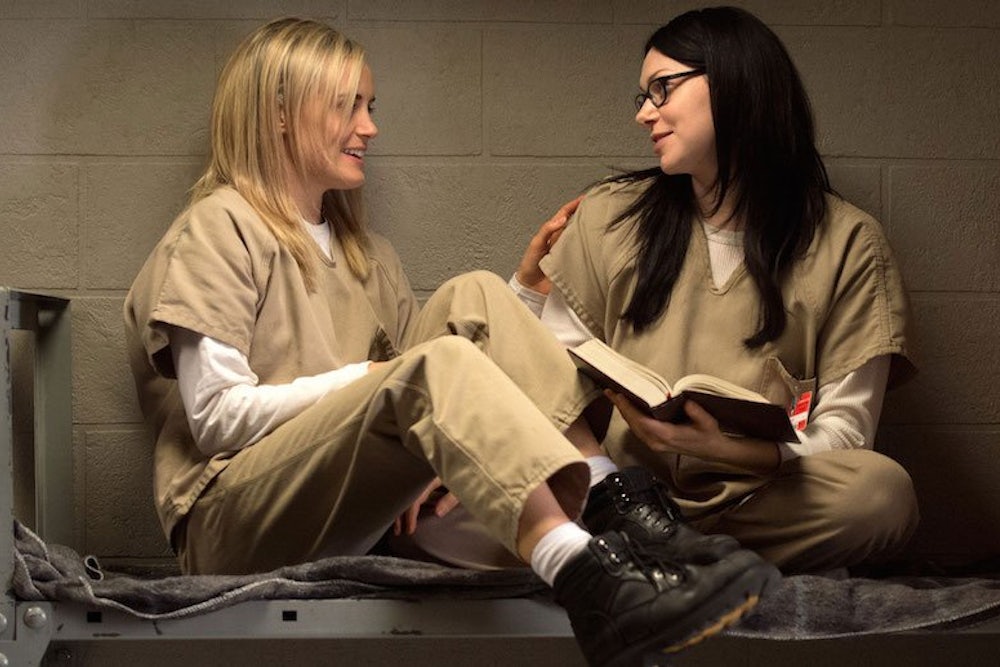The first few episodes of “Orange is The New Black”’s third season are so funny, so light-hearted, so warm and cozy, that it’s briefly possible to forget that everything takes place in a federal penitentiary. But only briefly. Despite complaints that the show has gone soft—the new season “scampers closer than ever to making prison seem kooky and adorable,” writes Willa Paskin at Slate, comparing the setting to summer camp and a playground—any moment of peace at Litchfield Prison is short-lived, soon to be ushered out by violence, negligence, and institutional indifference. There’s enough ambient danger to create an accumulating sense of dread. The season may begin with a rare interlude of calm, but over the course of 13 episodes (warning: moderate spoilers to come, for those who didn’t spend the weekend binging) everything slowly spins into chaos.
When Lorraine Toussaint’s Vee was run over in last year’s finale, the show’s only true villain was dispatched with, and season 3 is defined by that Vee-shaped void at the center. Vee wasn’t only an indelible character, a formidable sociopath who manipulated other inmates with ease; she was the primary plot engine, instigating conflict all around her. Without an overpowering antagonist, “Orange” at times feels aimless, lacking in forward momentum as its story stretches to encompass prison's every corner. That’s a feature, not a bug. “Orange” is at its best when it’s sloppy and sprawling and transcendent. The show no longer needs its thin blond anti-heroine—Taylor Schilling’s Piper—to serve as a “trojan horse,” our window into the complicated lives of these complicated women, and it doesn’t need a mustache-twirling villain anymore either.
As one of the few characters presented in a wholly negative light, Vee had no hidden depths. She was introduced as a menace to the fragile prison ecosystem and that is exactly what she was. This season, though, “Orange” spreads its empathy around more generously, extending it even to the (male!) guards. Healy (Michael Harney) is still a prideful bigot who often fails at his job, but seeing him as a little boy (in two of the show’s most darkly funny flashbacks) we understand some of how he got that way. Gloria (Selenis Leyva) and Aleida (Elizabeth Rodriguez) help set a vicious hate crime in motion, and do nothing to stop it; I could hate them for that, and one episode later, feel for them in their parenting struggles. Pennsatucky (Taryn Manning), who spent the first season caricatured as an Appalachian meth-head murderer, has somehow become the most sympathetic character. And as always, Piper takes up too much space: Her toxic romance with Alex (Laura Prepon) becomes less interesting as it goes on, and her new love interest, Stella, played by Australian supermodel Ruby Rose, never gains any characterization deeper than “sexy cool lesbian chick with tattoos.” At the end of the season, Piper has become the closest thing ‘Orange” has to a villain, albeit an isolated and impotent one.
Feeling aimless themselves, the inmates search for something larger to latch onto. Red (Katie Mulgrew) is lost without a kitchen to run and a surrogate daughter to protect. Poussey (Samira Wiley) is lonely and increasingly dependent on the moonshine she stows away behind ceiling tiles. “I don’t need to talk about how I need a drink, I need a reason not to drink,” she replies when Taystee urges her to get help. “Is AA going to make me feel useful?” Strange and unlikely coping mechanisms flourish: alien erotica, spiritual awakenings, an ad-hoc religious movement. “I’m not surviving, I’m just existing,” a beaten-down Brook Soso (Kimiko Glenn) tells her old friend Meadow during visiting hours. That conflict—the struggle to survive, to resist dehumanization in a system hell-bent on ripping away any shred of personhood—applies to so many of these women.
With its almost fable-like ending, “Orange” abandons any pretense of realism. The women of Litchfield are granted a miracle. But the season doesn’t end on their brief moment of grace. Instead, two new buses arrive at Litchfield transporting prisoners, and lines of anonymous women in orange jumpsuits walk in through the gates. We may have reached a catharsis, but the prison industrial complex is still there, still ready to swallow them whole.
